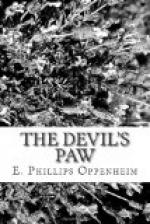“The Bishop wishes to see Mr. Fenn,” his guide announced.
“Show him in at once,” a voice from the middle of the room directed. “You can go and have your lunch, Johnson.”
The Bishop found himself alone with the man whom he had come to visit,—a moderately tall, thin figure, badly-dressed, with a drooping moustache, bright eyes and good forehead, but peevish expression. He stood up while he shook hands with the Bishop and motioned him to a chair.
“First time you’ve honoured us, Bishop,” he remarked, with the air of one straining after an equality which he was far from feeling.
“I felt an unconquerable impulse to talk with you,” the Bishop admitted. “Tell me your news?”
“Everything progresses,” Nicholas Fenn declared confidently. “The last eleven days have seen a social movement in this country, conducted with absolute secrecy, equivalent in its portentous issues to the greatest revolution of modern times. For the first time in history, Bishop, the united voice of the people has a chance of making itself heard.”
“Mr. Fenn,” the Bishop said, “you have accomplished a wonderful work. Now comes the moment when we must pause and think. We must be absolutely and entirely certain that the first time that voice is heard it is heard in a righteous cause.”
“Is there a more righteous cause in the world than the cause of peace?” Fenn asked sharply.
“Not if that peace be just and reasonable,” the Bishop replied, “not if that peace can bring to an end this horrible and bloody struggle.”
“We shall see to that,” Fenn declared, with a self-satisfied air.
“You have by now, I suppose, the terms proposed by your—your kindred body in Germany?”
Nicholas Fenn stroked his moustache. There was a frown upon his forehead.
“I expect to have them at any moment,” he said, “but to tell you the truth, at the present moment they are not available.”
“But I thought—”
“Just so,” the other interrupted. “The document, however, was not where we expected to find it.”
“Surely that is a very serious complication?”
“It will mean a certain delay if we don’t succeed in getting hold of it,” Fenn admitted. “We intend to be firm about the matter, though.”
The Bishop’s expression was troubled.
“Julian Orden,” he said, “is my godson.”
“Necessity knows neither friendship nor relationship,” Fenn pronounced didactically. “Better ask no questions, sir. These details do not concern you.”
“They concern my conscience,” was the grave reply. “Ours is an earnest spiritual effort for peace, a taking away from the hands of the politicians of a great human question which they have proved themselves unable to handle. We should look, therefore, with peculiar care to the means we adopt.”
Nicholas Fenn nodded. He lit a very pungent cigarette from a paper packet by his side.




